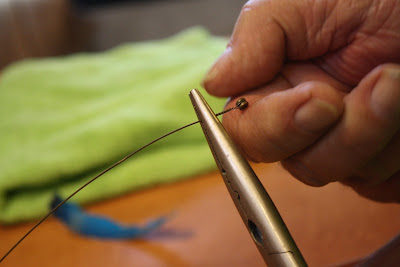I understand that some of the pics I put on the last blog did not come through. Sorry about that I will try and reload them now so if you want to view them you can. If they are not there then I am not smarter than a 5th grader and could not get the job done.... or I am.
I am smarter than a fifth grader!!! Well my peeps are anyway. The pics are there if you look.
The weather is wonderful today. It is in the low 80"s and just a hint of a breeze, just enough to cool you to pleasant. We have decided not to get a 5th wheel and truck. Things just did not come together for us. We were hoping, but our help did not come through for us.
Was out walking and came upon this pair, one (male) chasing the other (female) and she was able to make it to her nest and turned around before.....


This is the look of one determined dude. LOL
Just saying look out lady!!
I have two musical instruments called mountain dulcimers. I have had them for some time, but have not played them on a regular bases for a while. When I first got them I knew people that played and we would get together every week and jam. Well life changes and people move, some retire and we are separated by many miles now. It is just more fun to jam with others than play by yourself. I use them for wall art, which they do a great job of that too. I have decided to get serious about learning how to play them and even get good at it. But to do that one has to practice, practice. You would think being retired I would have lots of time, but it is dark before you know it.
The Appalachian dulcimer (or mountain dulcimer) is a fretted string instrument of the zither family, typically with three or four strings. It is native to the Appalachian region of the United States. The body extends the length of the fingerboard, and its fretting is generally diatonic, no sharps or flats. Few true specimens of the mountain dulcimer exist from earlier than about 1880
Well the strings have gotten yucky just hanging on the wall so decided to head for the music store and get some new shiny ones.
Rog is taking the old ones off.
I am smarter than a fifth grader!!! Well my peeps are anyway. The pics are there if you look.
The weather is wonderful today. It is in the low 80"s and just a hint of a breeze, just enough to cool you to pleasant. We have decided not to get a 5th wheel and truck. Things just did not come together for us. We were hoping, but our help did not come through for us.
Was out walking and came upon this pair, one (male) chasing the other (female) and she was able to make it to her nest and turned around before.....


This is the look of one determined dude. LOL
Just saying look out lady!!
I have two musical instruments called mountain dulcimers. I have had them for some time, but have not played them on a regular bases for a while. When I first got them I knew people that played and we would get together every week and jam. Well life changes and people move, some retire and we are separated by many miles now. It is just more fun to jam with others than play by yourself. I use them for wall art, which they do a great job of that too. I have decided to get serious about learning how to play them and even get good at it. But to do that one has to practice, practice. You would think being retired I would have lots of time, but it is dark before you know it.
The Appalachian dulcimer (or mountain dulcimer) is a fretted string instrument of the zither family, typically with three or four strings. It is native to the Appalachian region of the United States. The body extends the length of the fingerboard, and its fretting is generally diatonic, no sharps or flats. Few true specimens of the mountain dulcimer exist from earlier than about 1880
Well the strings have gotten yucky just hanging on the wall so decided to head for the music store and get some new shiny ones.
Rog is taking the old ones off.

The string is then taken off at the other end of the dulcimer and this is done four times because there are four strings in all on the dulcimer.
 He is using a auto guitar tuner. Notice the needle on the dial. It is in the middle of the dial when the correct note is heard when you pluck the string. Also there are red and green lights. When the light is green only that also means the correct note has been plucked. The red /green lights means almost there. When you put new strings on an instrument it may need to be retuned several times because the strings will stretch.
He is using a auto guitar tuner. Notice the needle on the dial. It is in the middle of the dial when the correct note is heard when you pluck the string. Also there are red and green lights. When the light is green only that also means the correct note has been plucked. The red /green lights means almost there. When you put new strings on an instrument it may need to be retuned several times because the strings will stretch. Here I am playing with a tuned dulcimer with brand new shiny strings. There is no excuse for me now.








No comments:
Post a Comment